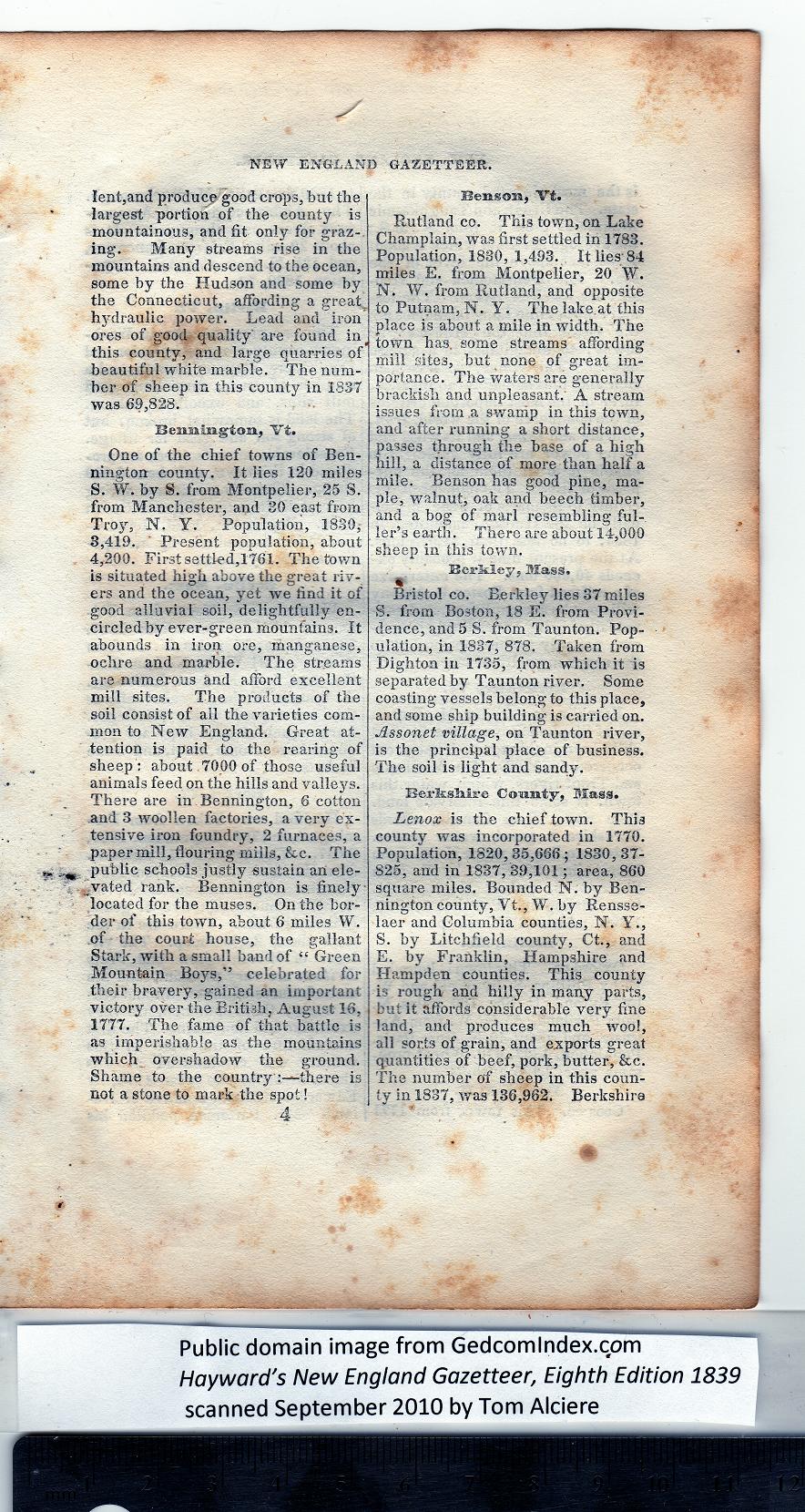|
lent,and produce good crops, but the
largest portion of the county is
mountainous, and fit only for graz-.
ing. Many streams rise in the
mountains and descend to the ocean,
some by the Hudson and some by
the Connecticut, affording a great
hydraulic power. Lead and iron
ores of good quality' are found ing
this county, and large quarries of
beautiful white marble. The num-
ber of sheep in this county in 1837
was 69,828.
Beimington, Vt.
One of the chief towns of Ben-
nington county. It lies 120 miles
S. tV. by S. from Montpelier, 25 S.
from Manchester, and 30 east from
Troy, N. Y. Population, 1830*
3,419. ' Present population, about
4,200. First settled, 1761. The town
is situated high above the great riv-
ers and the ocean, yet we find it of
good alluvial soil, delightfully en-
circled by ever-green mountains. It
abounds in iron ore, manganese,
ochre and marble. The streams
are numerous and afford excellent
mill sites. The products of the
soil consist of all the varieties com-
mon to New England. Great at-
tention is paid to the rearing of
sheep : about 7000 of those useful
animals feed on the hills and valleys.
There are in Bennington, 6 cotton
and 3 woollen factories, a very ex-
tensive iron foundry, 2 furnaces, a
paper mill, flouring mills, &c. The
public schools justly sustain an ele-
wated rank. Bennington is finely-
located for the muses. On the bor-
der of this town, about 6 miles W.
of the court house, the gallant
Stark, with a small band of “ Green
Mountain Boys,” celebrated for
their bravery, gained an important
victory over the British? August 16,
1777. The fame of that battle is
as imperishable as the mountains
which overshadow the ground.
Shame to the country .’—there is
not a stone to mark the spot!
4
|
Bensoia, Vt.
Rutland co. This town, on Lake
Champlain, was first settled in 1783.
Population, 1830, 1,493. It lies; 84
miles E. from Montpelier, 20 W.
N. W. from Rutland, and opposite
to Putnam, N. Y. The lake.at this
place is about a mile in width. The
town has. some streams affording
mill sites, but none of great im-
portance. The waters are generally
brackish and unpleasant. A stream
issues from a swamp in this town,
and after running a short distance,
passes through the base of a high
hill, a distance of more than half a
mile. Benson has good pine, ma-
ple, walnut, oak and beech timber,
and a bog of marl resembling ful-
ler’s earth. There are about 14,000
sheep in this town.
Berltiey, Mass.
Bristol co. Berkley lies 37 miles
S. from Boston, 18 E. from Provi-
dence, and 5 S. from Taunton. Pop-
ulation, in 1837, 878. Taken from
Dighton in 1735, from which it is
separated by Taunton river. Some
coasting vessels belong to this place,
and some ship building is carried on.
Assonet village, on Taunton river,
is the principal place of business.
The soil is light and sandy.
Berlcsliire County, Mass.
Lenox is the chief town. This
county was incorporated in 1770.
Population, 1820,35,666; 1830,37-
825, and in 1837, 39,101; area, 860
square miles. Bounded N. by Ben-
nington county, Yt., W. by Rensse-
laer and Columbia counties, N. Y.,
S. by Litchfield county, Ct., and
E. by Franklin, Hampshire and
Hampden counties. This county
is rough and hilly in many parts,
but it affords considerable very fine
land, and produces much wool,
all sorts of grain, and exports great
quantities of beef, pork, butter, &c.
The number of sheep in this coun-
ty in 1837, was 136,962. Berkshire |
